Our Curriculum
We want all our students to be everything they can be and everything they are meant to be – to be able to live life in all its fullness (John 10.10).
It is the firm commitment of the Cranmer Education Trust (CET) and Brian Clarke Academy that all our students enjoy a rich and ambitious curriculum that provides a platform for progression, aspiration and social mobility. There is no ceiling on students’ experiences or aspirations. Expectations are the same for all and all routes will lead to recognised qualifications.
Social, moral, spiritual, and cultural development (SMSC) is the golden thread running through all aspects of provision, designed to foster resilience, self-worth, cultural capital, social cohesion and integration.
The breadth of curriculum provision in Years 7-9 will enable a large majority of students to take and enjoy the full EBacc at GCSE (Maths, English, Science, History, Geography, Religious Studies and German). At Key Stage 4 this will be supported by an Open Pot of subjects and qualifications that enable every student to succeed and progress.
Our curriculum includes co-curricular enrichment and enhancement to further build social and cultural capital.
The academic, co-curricular and pastoral curriculum ensures students leave our schools as well rounded, informed and resilient young people ready to take their place in the world.
Principles that underpin our curriculum design
- Broad – so that young people gain knowledge and understanding of the range of ways in which human beings have understood and found meaning in our world – the best that has been thought, said and created.
- Deep – so that as they develop and gain experience, young people understand the concepts which provide structure to human beings’ search for meaning and its complexity.
- Rich – so that all children and young people can widen their horizons develop creativity, life experiences, and increase cultural capital.
- Interconnected – so that our students are able to see links and connections within and across learning, can synthesise new information, tackle complex questions from a range of perspectives and understand that knowledge itself evolves, changes and is contested and dynamic.
- Progressive – learning builds on prior experience, gradually deepening understanding and mastery.
- Relevant – so that our young people are prepared for the next stage of their education, and for life in modern Britain as good neighbours and citizens: ethically and morally grounded; respectful of others and excited by diversity, compassionate and generous of spirit, and able to lead, build community and do good as they go. Our primary curriculums are strongly linked to the context of the school and its locality, reaching out from there to the wider world, building strong general knowledge and cultural capital.
Principles for Learning
- A rigorous and academic curriculum requires high levels of literacy. A whole school cross-curricular pedagogy to supporting literacy and reading underpins both curriculum design and teaching and learning.
- High quality learning time, where young people are given time to master and apply key disciplinary concepts.
- An understanding of the cognitive science of how students learn – ensuring they can remember and do more, grow in self-motivation and self-management; aiming for fluency and automaticity in key concepts which feature in our curriculum
- Formative assessment: we check students’ understanding systematically, identify and address misconceptions quickly, and respond and adapt teaching, as necessary.
- Achievement for All: our pedagogy is adapted, and learning is structured to ensure that all students, including those with Special Educational Needs and Disabilities, can access, enjoy and experience success in the same curriculum entitlement for all students. Specific challenges, barriers and issues are identified and addressed.
- Social development and fellowship – so that our young people look forward to coming to school because there are so many things to be involved in and so many new things to experience, where they can grow socially and emotionally.
The Brian Clarke Church of England Academy is proud to be part of the Cranmer Education Trust
Cranmer Education Trust is a company limited by guarantee and an exempt charity registered in England. Company registration number: 07687709. Registered Office: Cranmer Education Trust, c/o The Blue Coat School, Egerton Street, Oldham OL1 3SQ. The website address is www.cranmereducationtrust.com and the phone number 0161 785 5082.




